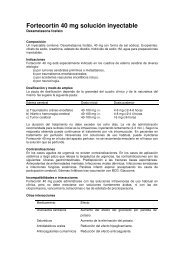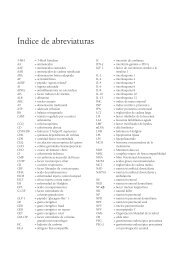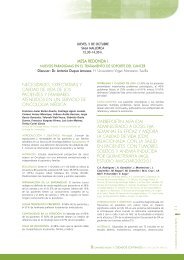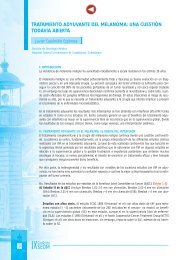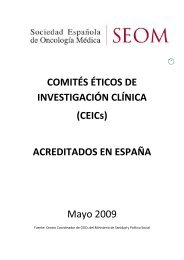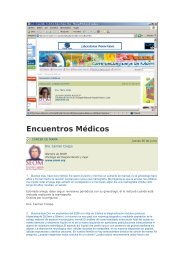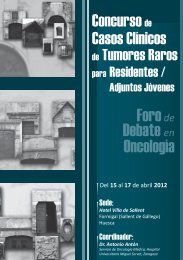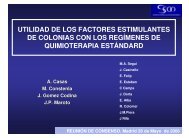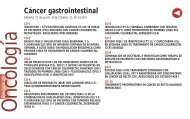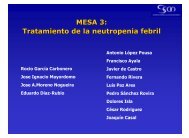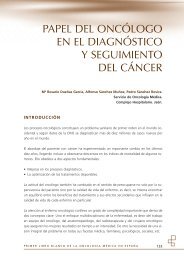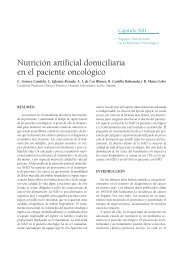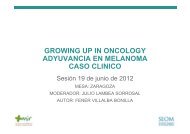Resúmenes de Ponencias - Sociedad Española de OncologÃa Médica
Resúmenes de Ponencias - Sociedad Española de OncologÃa Médica
Resúmenes de Ponencias - Sociedad Española de OncologÃa Médica
You also want an ePaper? Increase the reach of your titles
YUMPU automatically turns print PDFs into web optimized ePapers that Google loves.
CONSEJO GENÉTICO Y CÁNCER<br />
Shirley Hodgson<br />
Professor of Cancer Genetic<br />
St George’s Hospital Medical School Genetic Counselling and Cancer. Longres, Inglaterra<br />
There is a rapidly-increasing awareness of the importance of inherited factors in cancer susceptibility, which<br />
is reflected in a great increase in referrals to cancer genetics services for genetic advice and screening. The<br />
issues that need to be addressed in managing this <strong>de</strong>mand are:<br />
• How effective are screening and prophylactic measures in high-risk individuals in reducing cancer morbidity<br />
and mortality?<br />
• How is risk assessed?<br />
• How should referrals be ascertained, prioritised and managed?<br />
Genetic counselling is a process by which a family tree is <strong>de</strong>termined and from it a risk assessment ma<strong>de</strong> and<br />
communicated to the patient of<br />
• the chance that there may be a genetic susceptibility to specific types of cancer in certain individuals<br />
in the family;<br />
• whether a genetic test for such a susceptibility may be possible in that family;<br />
• the risk to the consultand of <strong>de</strong>veloping specific cancers, and what can be done to reduce that risk;<br />
• what can be done to ascertain and counsel other members of the family in a similar way.<br />
There are several important factors to bear in mind:<br />
• the need for confi<strong>de</strong>ntiality, particularly in view of the fact that data about relatives of the consultand<br />
will need to be obtained and recor<strong>de</strong>d;<br />
• the importance of obtaining confirmation of the diagnosis in affected individuals;<br />
• the need to obtain written consent from these affected relatives by an approach from the consultand<br />
before such information is obtained;<br />
• the need to respect genetic information about an individual and to release it only with that individual’s<br />
consent, other than in exceptional circumstances when the interests of a relative may over-rule<br />
a person’s <strong>de</strong>sire not to release such information.<br />
The most common reasons for referral to a cancer genetics centre are a family history of breast/ovarian or<br />
colorectal cancer. The vast majority of people referred to such centres in the UK are female, and most have<br />
children. Their reasons for attending are largely to assess and reduce the risks of cancer to themselves and<br />
their families.<br />
Approximately 5% of breast and colorectal cancers are due to inherited mutations in highly-penetrant, dominantly<br />
inherited genes: BRCA1 and BRCA2 in the case of breast/ovarian cancer and APC (causing familial<br />
a<strong>de</strong>nomatous polyposis, FAP) and the genes causing hereditary non-polyposis colorectal cancer (HNPCC).<br />
FAP is the only one of these conditions that can be diagnosed clinically with ease, so that the assessment<br />
of risk for the other genes is based on an evaluation of the pedigree. There is a number of computer packages<br />
that can assess risk: for example, the “Cyrillic” program which assesses the risk of a BRCA1 or BRCA2<br />
176<br />
Congreso<br />
IXSEOM



